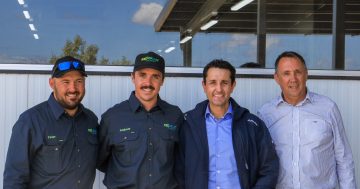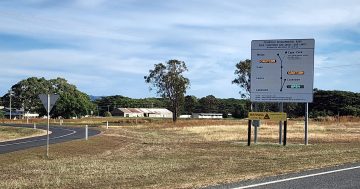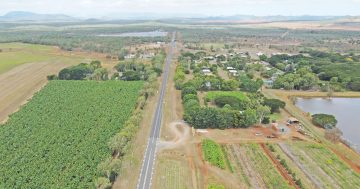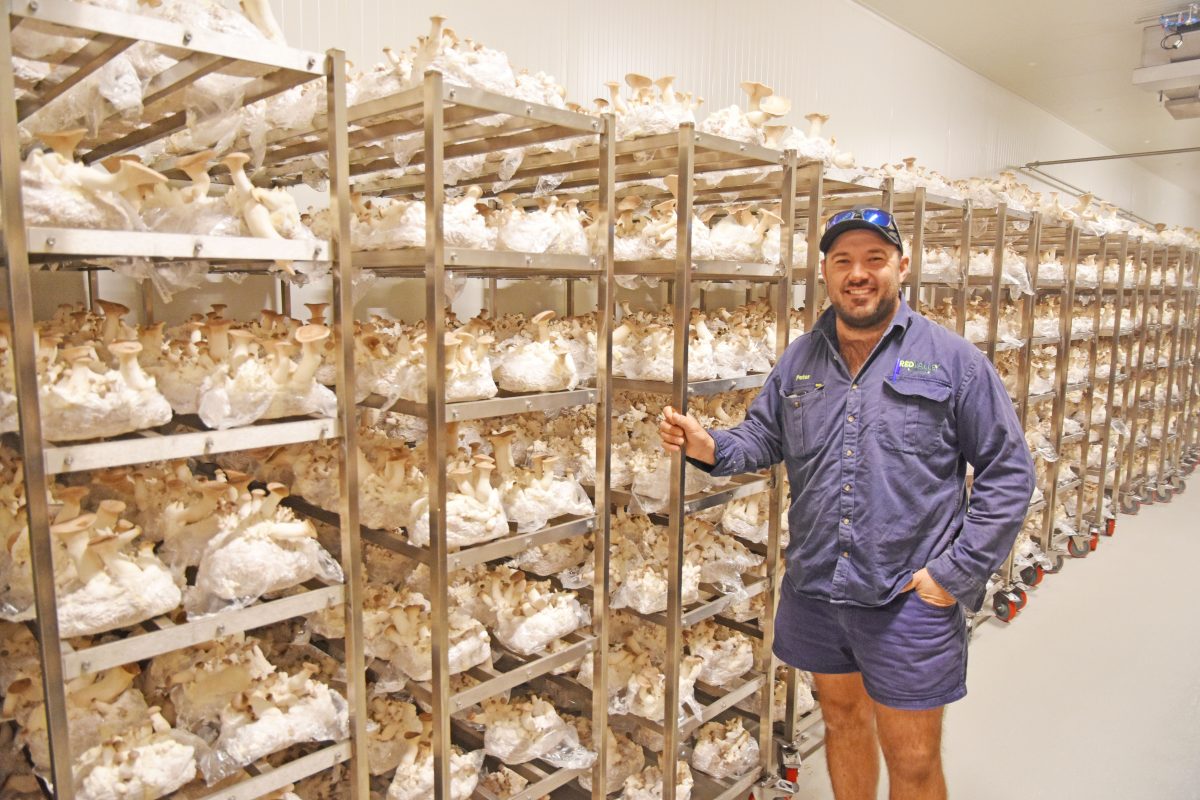
Peter Inderbitzin Jnr says the mushrooms are kept on shelves in specially-designed rooms so they can grow and then get harvested.
PETER Inderbitzin Jnr says he’s happy to be running Australia’s biggest exotic mushroom farm, even though he wasn’t keen on the idea when it was pitched to him.
The first mushrooms grown out of Red Valley Farms’ massive shed hit the markets a month ago – a major milestone in what has been a six-year journey.
“We definitely had a few beers that night,” Peter said.
He said his parents, Peter Snr and Franziska Inderbitzin, came up with the idea to diversify away from bananas after going on a much-needed holiday.
“They were looking to retire so we were reducing their workload and sent them away for three months on a European holiday to catch up with family and enjoy themselves,” he said.
“They came back and said they had been to this amazing place.
“We want to get into exotic mushrooms, they said. And I said, no, I’m not interested. We’re too busy. I’ve just taken over the farm.
“They worked on us for nine months and said, ‘Oh, look, why don’t you just go on a holiday and have a look at the factory?’
“In the end, they convinced us and we went over to look.
“I was just blown away by how clean it is and how much easier it is for staff; it’s light work.
“So when I came back I said, yeah, let’s look into this.”
The rest, as they say, is history.
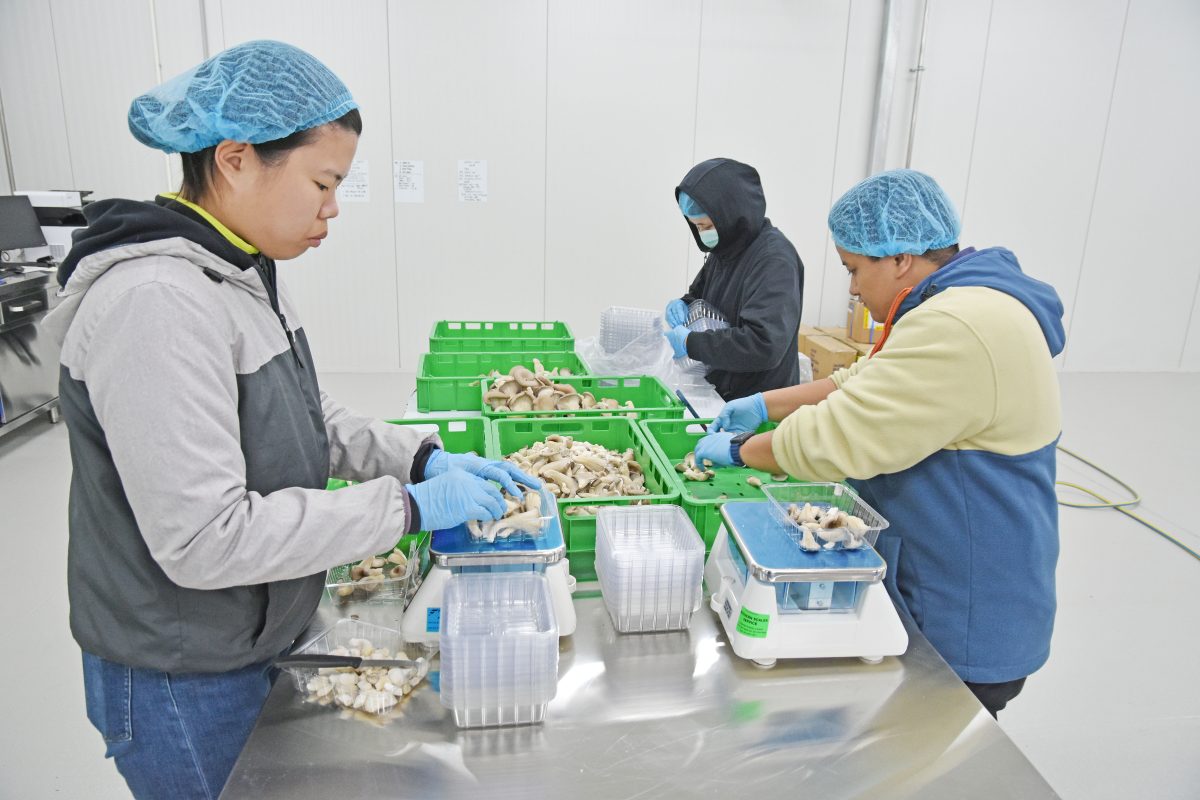
Staff carefully weigh and package the exotic mushrooms in the Lakeland shed, ready for market.
But when you take on a project that no one is doing in Australia – and certainly not in a remote area like Lakeland – it wasn’t a walk in the park.
Known for their innovation, the Inderbitzins were pioneers of the Lakeland banana industry and hope their exotic mushrooms will create a new legacy for the family.
“Anything that mum and dad have done (on the farm) has always been for the next generation and I guess I’m trying to do that here,” Peter said.
“We’re not going to see the benefits until the next generation.”
At the moment, there are two types of mushrooms grown at Red Valley Farms.
“We’ve got the King Oyster and the standard Oyster at the moment but will also grow the Shimeji and the Shiitake, which is only about six weeks away from starting up,” Peter said.
“There is a huge amount of health benefits from your exotic range of mushrooms and there are a lot more flavours in those varieties.
“They’re not just a plain mushroom and they don’t break down in a food dish like the Champignon or your Button mushrooms.”
With more of the world going vegan or vegetarian, many kitchens are using exotic mushrooms as substitute ingredients.
“The varieties we are growing have the potential to go into a meatless product,” Peter said.
“They’re already using King Oysters as a full meat replacement in parts of Europe.”
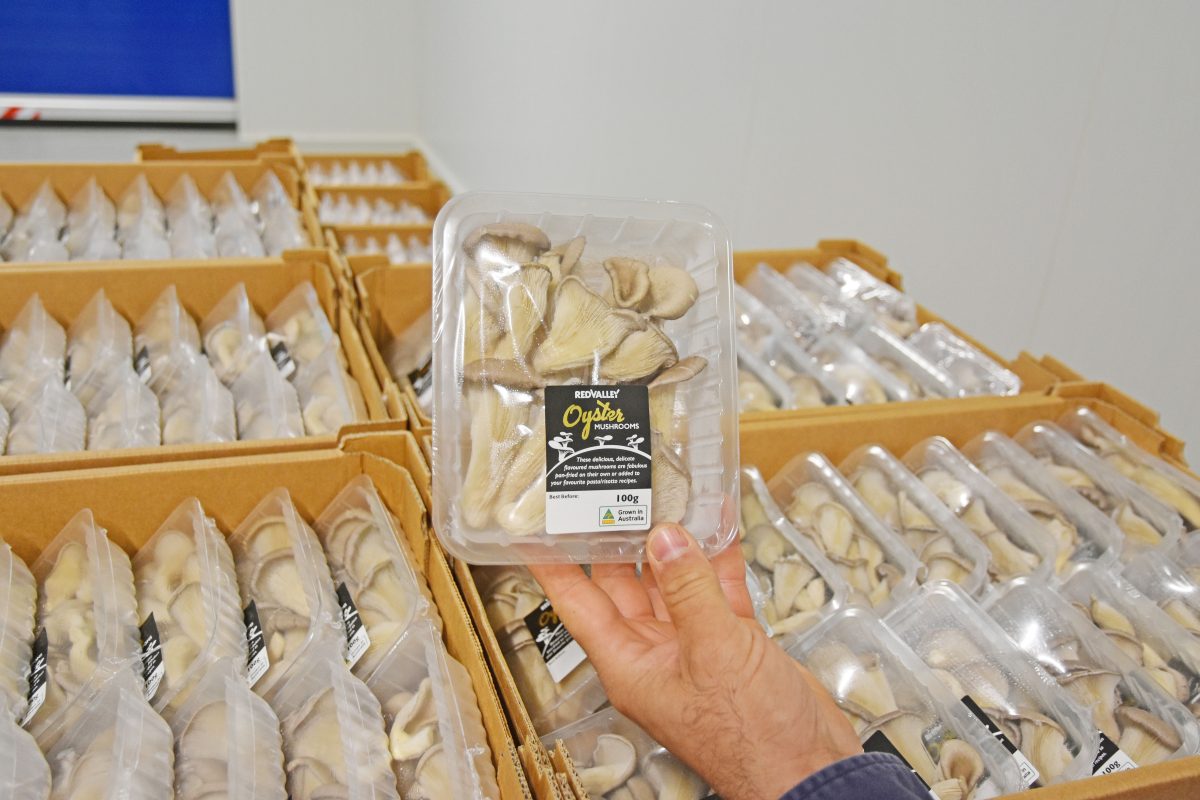
Oyster mushrooms are growing in popularity around the world. Not only because they taste good, but also because they can be used as a meat replacement in some meals.
Being grown in Australia will mean a lot in the long, run, Peter said.
“There’s a huge demand for Australian produce in Australia and overseas at the moment and we’re proud to be growing great fresh produce here,” he said.
“The mushrooms you buy at the supermarket, a very small percentage are grown in Australia.”
There is also pressure on being environmentally friendly and reducing carbon emissions.
Peter said those challenges were at the forefront of the design.
“We want zero waste and as far as water goes, we won’t use any more than 10 megalitres a year and that’s at the worst case,” he said.
“Our power is going to be a long-term issue, but we’re doing it in stages. For the time being, we’re connected to Ergon, but I want to disconnect within four years.
“Once we see how much power we’re using and require, we’ll be able to build our own standalone system.
“That might be using solar and batteries, potentially hydrogen, which is a growing industry.
“Even the plastics; I’m just in discussions with our supplier and we are looking to do a recycling process which will see it cleaned and put back into production.”
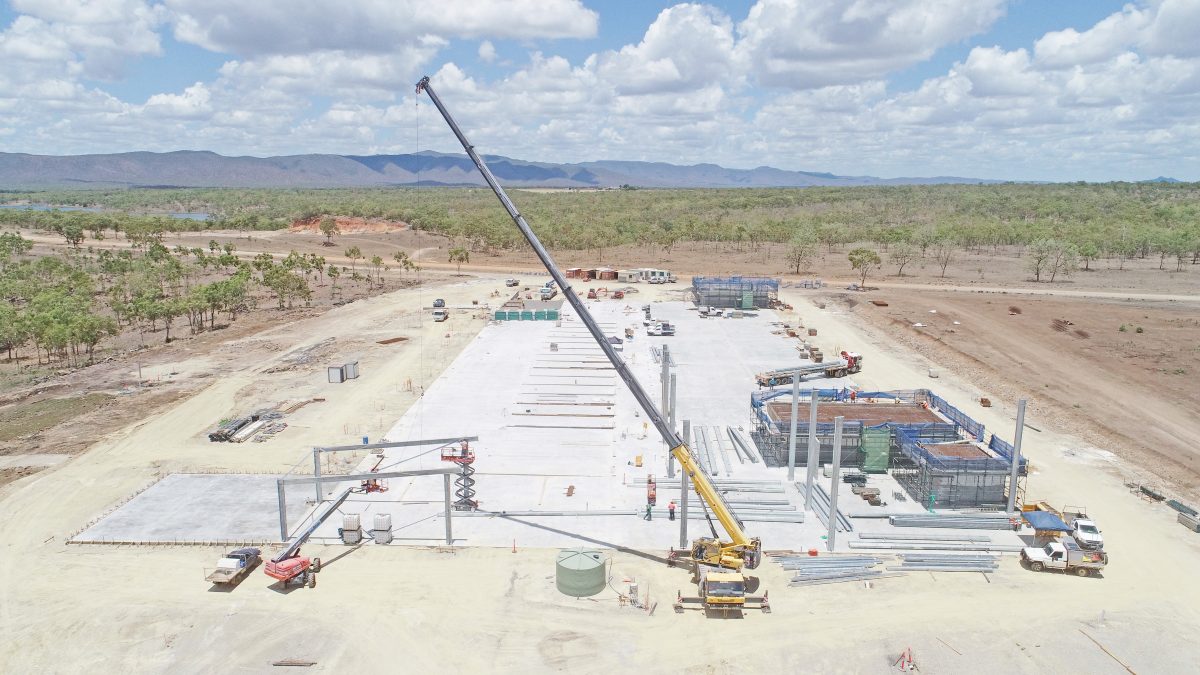
Before … Construction began on the massive shed at Lakeland, which was formerly a gravel pit for Red Valley Farms.
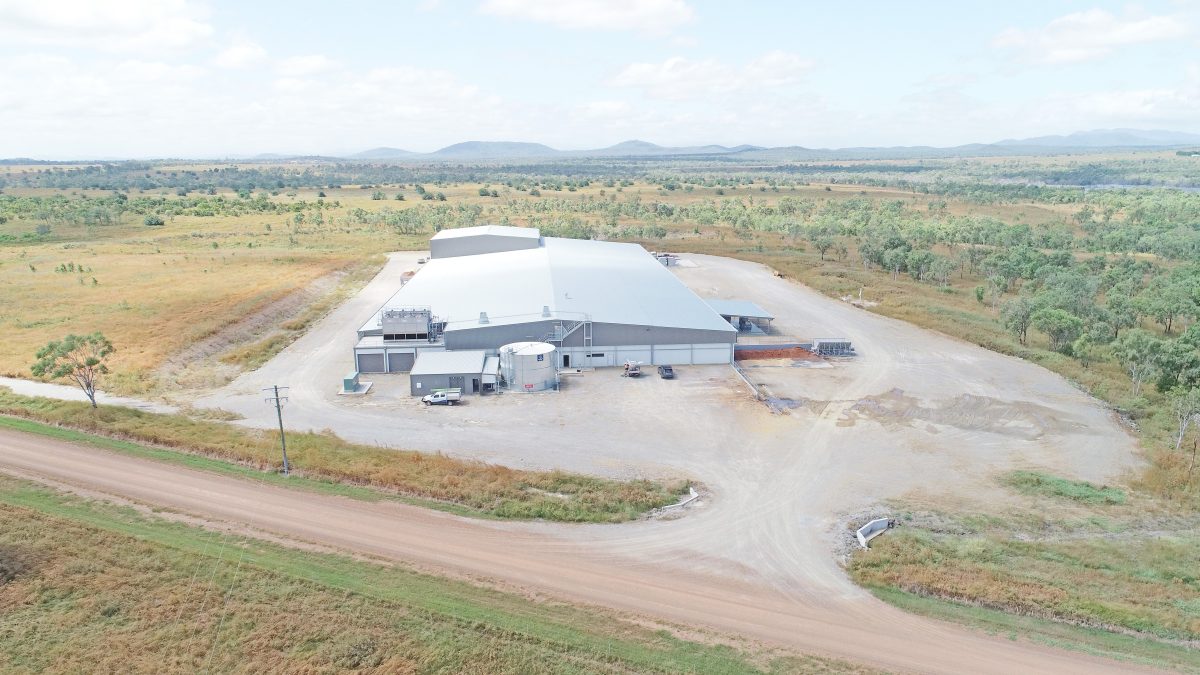
After … The purpose-built mushroom shed is 9600m2, which is bigger than a rugby league field.
The Inderbitzins were already at the forefront of waste reduction, having created a company called Shark Recyclers, situated on the outskirts of Mareeba at Biboohra.
The compost business not only services their banana farm, but also sells to the public.
“We’ve always had quite a large waste product from the bananas and we were always looking for other opportunities to reduce our chemical inputs,” Peter said.
“What I mean by that is fertiliser, which comes at a cost. And it’s also not good to have repeated applications for many years on the same land.
“So we were looking for something to improve the health of our soil long-term, as well as keep diseases and pests out.
“Obviously, the mushroom waste will go down there now and we can close the loop that way.
“Once the compost is made we bring it back and apply that on to the bananas.”
While there is no end sight for the banana business, Peter and his family acknowledge the challenges of growing produce in Australia.
“It’s becoming harder and harder to be in agriculture,” he said
“The wage increases, the cost increases, the cost of land … it’s getting harder and harder.
“So I think you’ve got to think outside the box and try and find something that is going to work best for you in your environment.”
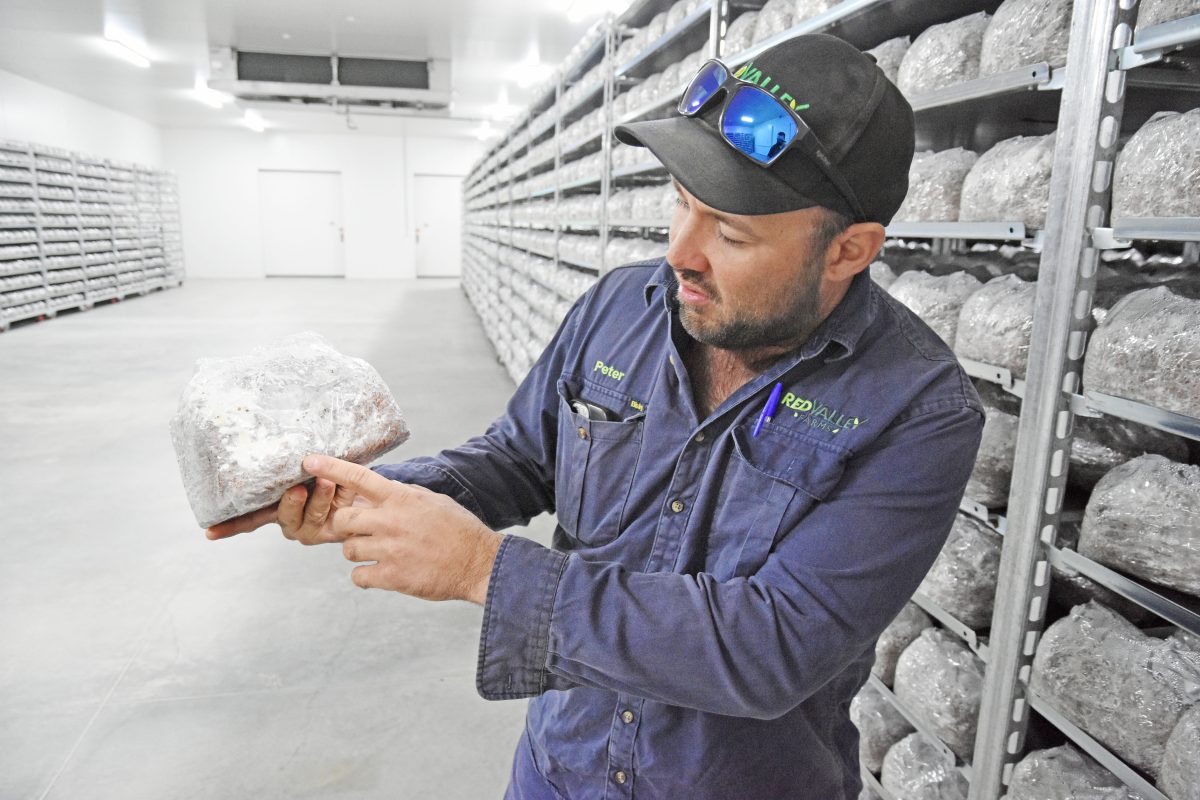
Peter Inderbitzin Jnr in one of the temperature-controlled mushroom-growing rooms.
Building a giant 9600m2 shed on the outskirts of Lakeland might not have been the smartest business decision, but it did suit Peter and his family’s lifestyle.
“The best thing would have been building it in Sydney or Brisbane, so that was close to contractors and close to a large quantity of markets,” Peter said.
“The real reason (I built in Lakeland) is I just didn’t want to move.”
With no template to work off in Australia, meticulous research and planning went into the design.
“Everything had to be precise, like all the air pressures within a room. When you open up a door, the air has to flow a certain way to stop the room from sucking in contaminated air,” Peter said.
“All those little things had to be accounted for.”
When production is at full scale, the mushroom farm could employ about 45 people. The banana farm has about 130 employees.
“We’re hoping to get more local workers in the mushroom shed because of the nature of the work,” Peter said.
“It’s definitely not as tough as working with bananas and it could suit someone wanting to work around school hours.”
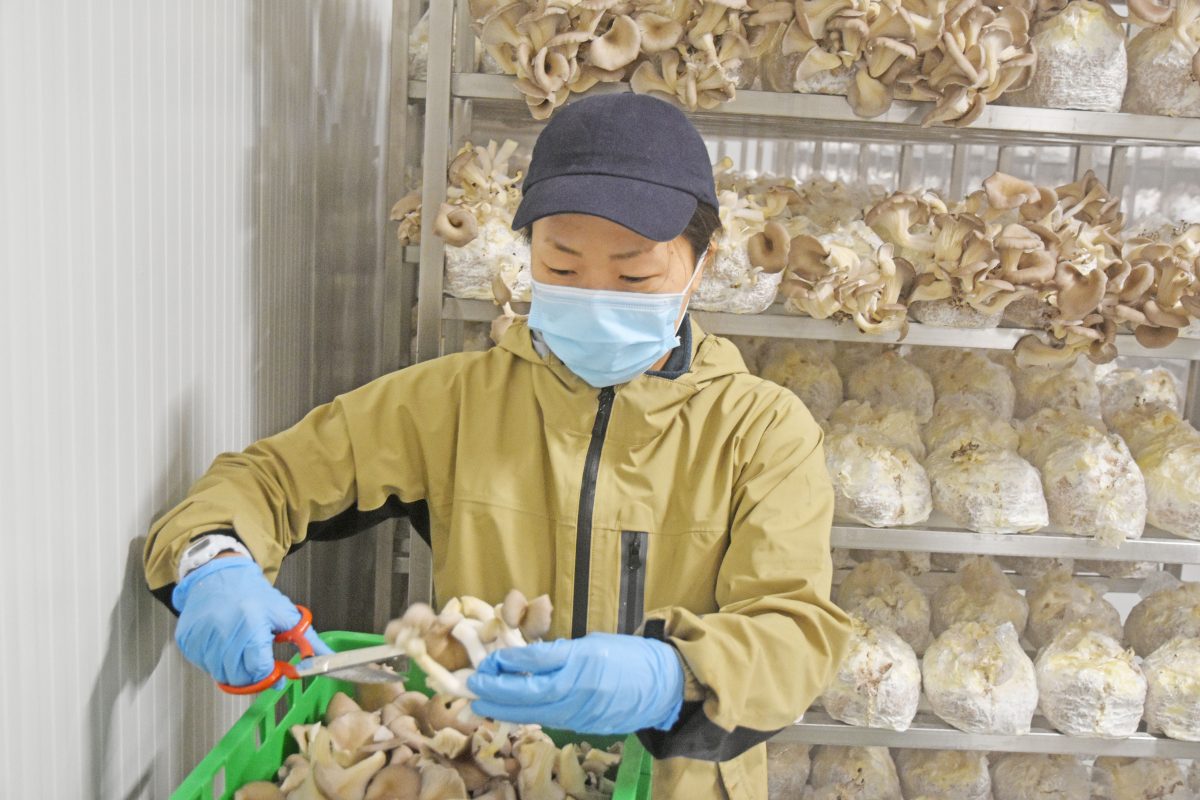
The mushroom farm will support up to 45 jobs at full capacity.
So when will you be able to buy Red Valley Farms mushrooms at your local supermarket?
“I’m hoping next year that we’ll be in all of the big supermarkets,” Peter said.
“At the moment, you can buy our Oysters and King Oysters at your smaller fresh fruit grocers in Brisbane and Melbourne.
“But we’re hoping by about January next year we will be in most Woolworths and then we’ll transition to Coles and Aldi.
“Overseas export is an option and maybe a long-term goal but I’d prefer to stay within Australia.”
Cape York locals wanting to get their hands on some can stop at the Steffie’s fruit and vegetable stall on the PDR, just outside of Lakeland.
The roadside business is run by Stef O’Kane, one of Peter’s sisters.


